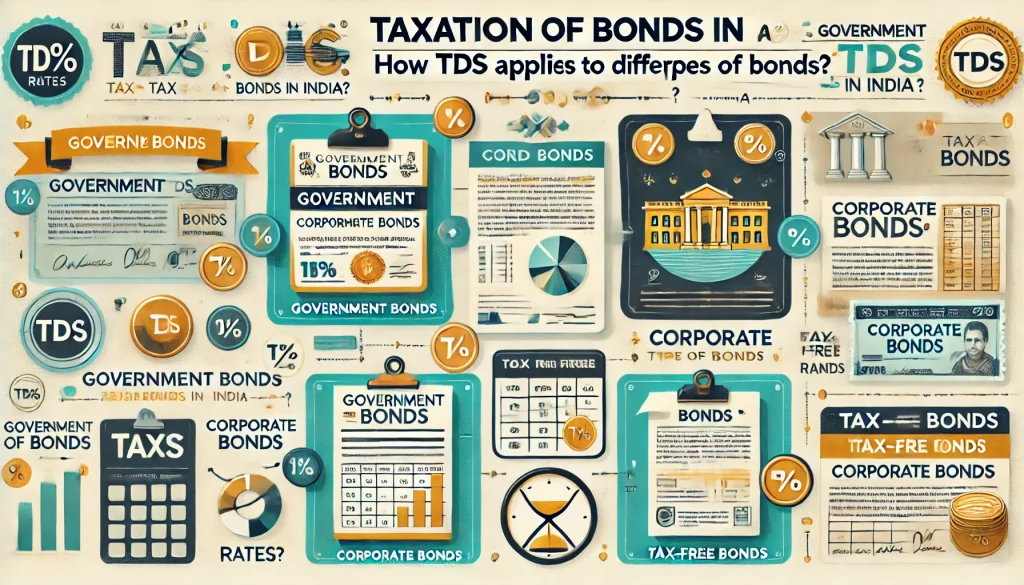
As you already know, bonds are fixed-income instruments that are issued by governments, corporations and similar bodies to fund big projects. These might include expansion and maintenance of railways, power plants and construction of affordable housing facilities.
Bonds are high-security debt instruments that are categorised under fixed income asset class. They come with a maturity period, after completion of which the issuer must repay the investment amount along with part of profit from the project to the investor.
Some of the bonds are tax-exempt and hence called tax-free bonds. Read this blog till the end to know more about tax-free bonds.
What is a Tax-Free Bond?
Tax-free bonds are like government bonds in the sense that they are issued by the Government to raise funds for a particular purpose. However, unlike other bonds, these are exempt from income tax.
Along with the Central Government, government entities like municipalities, Municipal Corporations, government companies and public sectors can issue tax-free bonds. These bonds allow investors an opportunity to earn a predetermined interest rate with a comparatively lower risk of loss than equity and equity-related instruments.
Being tax-free, these bonds allow investors to save money and focus on capital growth. Similar to other bonds, issuer of tax free bonds will also repay the principal amount to you after maturity.
How Do Tax-Free Bonds Work?
To invest in tax-free bonds, you need to have a Demat account to store and trade them electronically. To trade with these tax-free bonds, you might register into a trading platform which will help you buy or sell these bonds. You can invest in these bonds for a specific subscription period either online or offline.
After investing, you cannot withdraw or redeem the bond before 10 to 20 years. However, you can trade these bonds on stock exchanges with other investors. The interest that you will earn from them is tax-exempt and thus these bonds face high demand in the secondary market. Owing to this, there is a low supply of tax-free bonds during the tax-saving season.
Types of Tax-free Bonds
You can classify tax-free bonds into the following types.
1. Housing Bonds
Government bodies issue housing bonds to finance construction of affordable housing facilities and housing projects. Entities like National Housing Bank issue these tax-free bonds to finance such projects.
2. Power Bonds
Bonds that are issued by power generation companies to finance projects like maintenance and expansion of power plants.
3. Railway Bonds
These are tax-free bonds issued by Indian Railway Finance Corporation to execute projects regarding expansion and modernisation of the Indian Railway network.
4. Public Sector Unit Bonds
These bonds are issued by Public Sector Unit companies like National Highway Authority of India (NHAI), Power Finance Corporation (PFC), Housing and Urban Development Corporation Limited (HUDCO), Rural Electrification Corporation Limited (REC) and National Thermal Power Corporation (NTPC). These companies issue tax-free bonds to finance power, housing and infrastructure projects.
Features of Tax-Free Bonds
Let’s take a look at a few features that distinguish tax-free bonds from other bonds:
- Tax Exemption: Unlike other bonds, the interest that you will earn from these bonds are not taxable. Therefore, they are popular among investors to earn tax-free income.
- Tradable: You can trade the tax-free bonds in secondary market. This provides investors with liquidity and exit options.
- Long Term Investment Option: The maturity period for tax-free bonds mainly ranges from 10 to 20 years. This makes it a suitable option for investors with long-term investment goals and low-risk appetite.
- Non-convertible: Tax-free bonds are non-convertible, this means, you cannot convert them into equity shares of the issuing company.
- Fixed Interest Rate: With tax-free bonds, you will earn fixed interest throughout the bond’s maturity tenure. This helps you generate regular and fixed returns throughout the tenure despite market volatility.
- High Credit Ratings: These bonds are issued by government, government bodies and government-backed entities. Therefore, their credit ratings are quite high. This is the reason they have comparatively low risk of default.
- Lock-in Period: Tax-free bonds also have a lock-in period during which you cannot sell or redeem them.
How to Invest in Tax-Free Bonds?
The following steps will take you through the procedure to invest in tax-free bonds.
- Step 1: Open a Demat Account: The very first step to investing in a tax-free bond is that you must have a Demat account. You can choose a depository participant and open a Demat account with them online easily.
- Step 2: Choose a Suitable Tax-free Bond: You must conduct thorough research based on your risk appetite and investment goals to choose a tax-free bond. To take this decision you must also consider several parameters about the issuer as well.
- Step 3: Check for Your Eligibility: Before investing in a tax-free bond, ensure that you fulfil the eligibility criteria of the issuer. Usually, HUF, NRI and resident individuals are eligible to apply for tax-free bonds. However, the eligibility criteria might vary between issuers at times.
- Step 4: Application: After opening a Demat account, choosing a suitable bond and checking the eligibility, it is time to invest in it. You can get done with the application process through online portals or apps of stockbroking platforms. To complete the application process, you must transfer the investment amount from your bank account to the issuer.
- Step 5: Allotment: After successful application, you will receive an email from the issuer or a physical certificate depending on your mode of application with the issuer.
Benefits/Advantages of Investing in Tax-Free Bonds in India
Here are a few benefits or advantages of tax-free bonds that make it popular among investors:
- Safe Investment: Investors consider these bonds as less risky than equity and equity-related instruments. The fact that these bonds are backed by government entities makes it a favourable choice for investors with low-risk appetites.
- More Profitable for Individuals with Higher Tax Bracket: Interests from these bonds are tax-exempt. Therefore, people belonging to the higher tax slab can invest in tax-free bonds to avoid extra taxes on their income.
- Assured Returns: Tax-free bonds promise regular and fixed returns throughout the investment tenure. Thus, investors have the assurance of a uniform income despite market volatility.
Disadvantages of Investing in Tax-Free Bonds in India
Besides the above benefits, tax-free bonds also have a few disadvantages. You must consider the following disadvantages of tax-free bonds before planning an investment.
- Very Long Maturity Tenure: The extensive maturity tenure up to 10 to 20 years, makes the tax-free bonds disadvantageous for short term investors.
- These are Not Very Liquid: Despite getting listed in stock exchanges, tax-free bonds are not much liquid. Very often, investors trade with very low quantity stocks while trading with them. As a result, there is a chance for you to get stuck in case you are trading with a large volume.
- Frequent Oversubscription: Owing to its tax-exempt nature, there is always a high demand for these bonds. Therefore, despite having an application window of two to three days, they get oversubscribed very fast. Sometimes these tax-free bonds get oversubscribed on the day of their issue itself.
Tax-Free Bonds for Senior Citizens
The following reasons make tax-free bonds a popular investment option for senior citizens.
- The tax-free bonds offer capital security along with assured returns to senior citizen investors.
- They are backed by Government bodies and entities. This lowers the chances of defaulting from the issuer’s end and increases credibility.
- The interests on tax-free bonds are regular and stable.
Who Should Invest in Tax-Free Bonds in India?
The following categories of people can invest in tax-free bonds in India.
- These bonds have a maturity tenure of more than 10 years. Therefore, regular investors or senior citizens who are looking forward to a stable and long-term source of income can invest in them.
- With high credit ratings, tax-free bonds reflect a low risk of defaulting. Thus, these bonds are suitable for investors with low risk appetite like new investors or senior citizens.
- These bonds might also be suitable for investors who are planning to diversify their portfolio as these help in mitigating the risk to some extent.
To conclude, tax-free bonds allow investors to focus on capital growth without stressing on additional taxation. They also assure decent and regular returns and thus are healthy investment options for low-risk appetite investors.
This covers everything you must know about tax-free bonds. If you are a novice investor, consider seeking guidance from a financial expert to choose the right tax-free bond according to your financial capabilities.
Frequently Asked Questions
Government bodies and government-backed entities issue tax-free bonds. The issuers of tax-free bonds can be state, city and local governments.
Examples of tax-free bonds might include bonds issued by NTPC Limited, Power Finance Corporation and Indian Railway Finance Corporation Limited.
Tax-free bonds do not hold major default risk and act as a stable and long-term income source for low-risk appetite investors.
You can invest a maximum amount of ₹5 lakh per year in a tax-free bond and earn regular returns.


